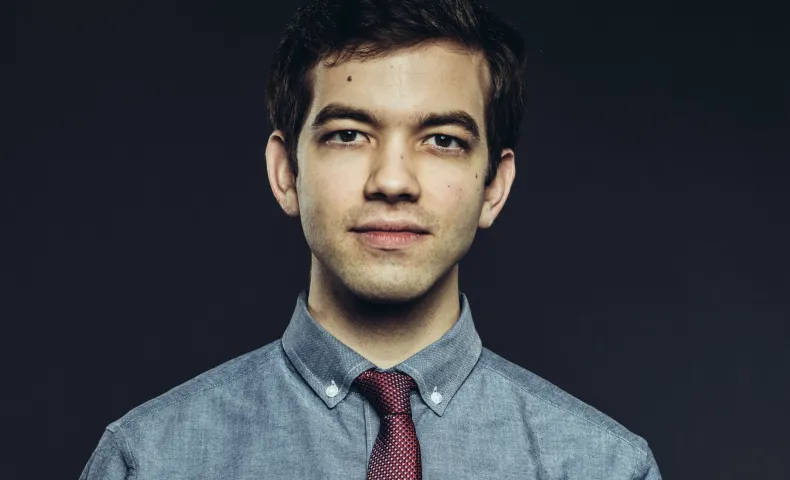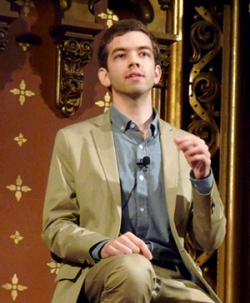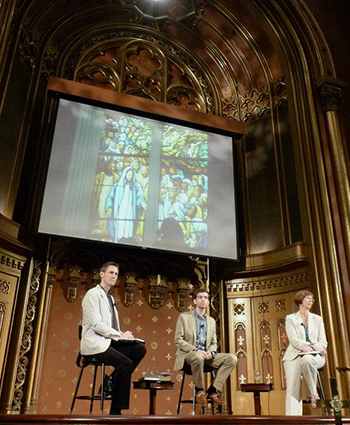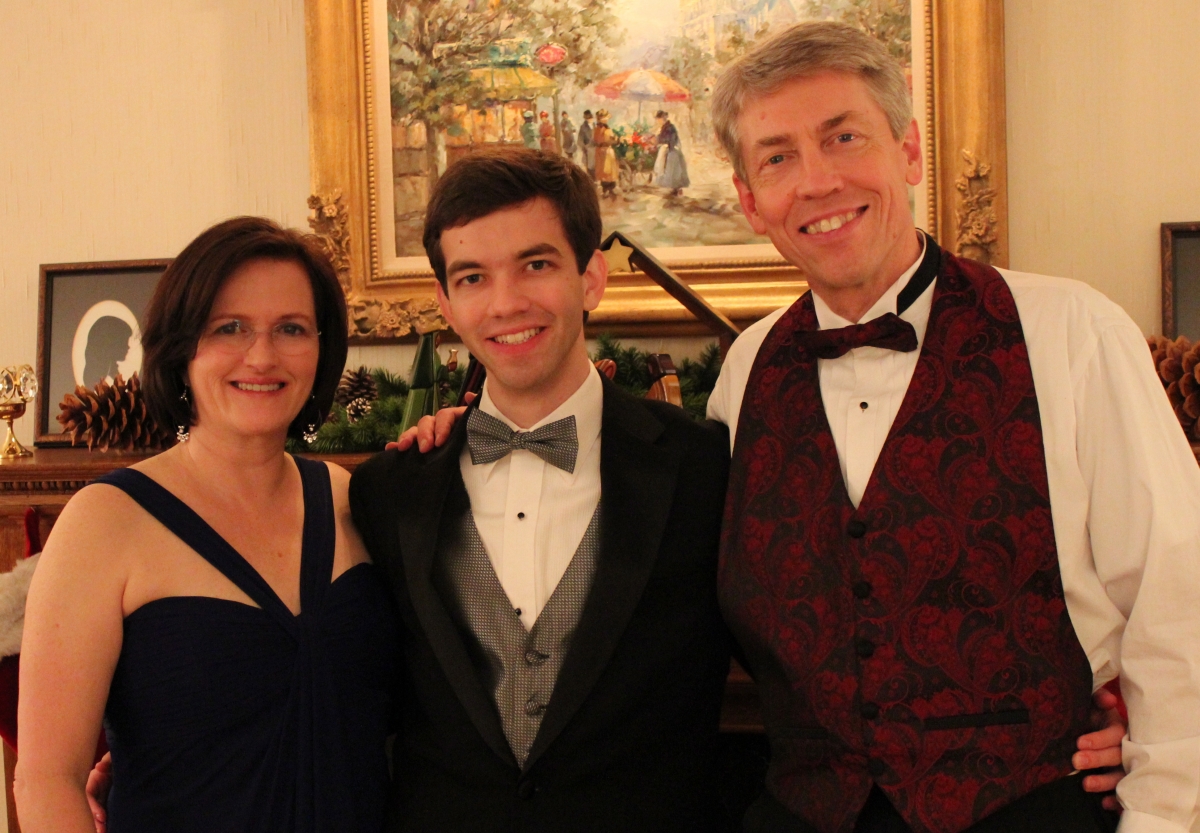 Photo by Stephen Voss
Photo by Stephen Voss
Matthew Vines
Matthew Vines was born and raised in Wichita, Kansas. Throughout his youth, Matthew’s family was deeply involved in a conservative evangelical Presbyterian church. After Matthew came out as gay while attending Harvard University, he took a leave of absence to do research on the Bible and sexual orientation and to work for LGBT inclusion in the Christian faith. In March 2012, Matthew delivered a speech in his community documenting the results of his research and calling for acceptance of gay Christians, including marriage equality. Since then, the video of the speech has been viewed more than 750,000 times. Matthew’s story provides hope that there are ways to build more support for gay and lesbian rights within faith communities, which have been a major source of opposition to marriage equality and nondiscrimination protections for LGBT people.
My mother had gone to our Presbyterian church since she was in high school. My dad met my mom in law school and had gone there ever since they were engaged. They were both elders at the church. My mom taught Sunday school classes there for many years. And my dad taught classes, too.
It was a good church with about 2,000 people in the congregation. And it was a central part of our lives growing up. The majority of our friends came from church.
Car-Ride Conversion
I started going to church at the age of three weeks. My parents instilled in both my sister and me from a very early age the paramount importance of Christian faith in our lives and their lives. They were not forcing it upon us. But they were definitely trying to set a very good example and impart to us their faith and help to nurture Christian faith in us as well.
I think I was three years old when I first accepted Jesus into my heart because, in Sunday school, they said this is what you need to do in order to become a Christian and to be saved. You need to ask Jesus to come into your heart. And he will come in.
And I thought, wow. That's so simple-sounding and so easy. That day, on the way home from church, I was in the car. And I just prayed to myself for Jesus to come into my heart. It's not like I had any grand conversion experience. It was all very natural.
Over the last few years, several mainline Protestant denominations have approved policies allowing the ordination of gay clergy, including the Presbyterian Church (U.S.A.), the Episcopal Church, the United Church of Christ and the Evangelical Lutheran Church in America. In addition, thousands of congregations across the country have formally voted to be welcoming of gay people. However, these welcoming congregations are vastly outnumbered by conservative congregations like Matthew’s, and religious leaders continue to play a influential role in opposing equal marriage rights and other protections for gay and lesbian people.
Unquestioned Conservative Theology
I didn't even become aware until middle school that I was attending a conservative church. Granted, the church, to its credit, was not an overtly political church. The clear majority of the congregants were conservative Republicans. But they did not preach about Republicans from the pulpit. They were not preaching about abortion. They were not preaching about homosexuality. And they were not preaching about politics.

But it was definitely a politically conservative community and they preached conservative theology. To me, growing up, that's just what church was. And that's just what Christianity was. And I didn’t really question it.
That's part of the reason why being gay in a conservative Christian church can be so painful and hard for young kids who are aware of their orientation from a very young age. For them, it's much harder to separate what these people think from what God thinks.
Maybe I Should Date Someone
Matthew came out in 2009. He was attending Harvard University at the time.
I didn't even think about dating all through high school. It was like it never crossed my mind. Then, I went to college and I had a lot more free time. And I was thinking that I want to have a family. I want to get married some day. And I said to myself that, if I wanted to get married, maybe I should date someone. Maybe I should try to figure it out.
And so I started spending a fair amount of time during my freshman year trying to manufacture romantic interest in different girls at school. I just tried to think about people who I thought seemed like really great people, people I should be attracted to.
I would work at trying to build these crushes. And they wouldn't come. I couldn't make those feelings happen. And again, it should have been obvious what was going on. But when you're coming from a situation where the consequences of being gay can be very bad, then obviously you're not going to let yourself be open to that possibility in the same way that you would otherwise.
In the fall, a number of things were going on that allowed me to get to the point where I actually was able to consider whether or not I might be gay. And I realized that I was. I realized that I actually do have a sexual orientation. I actually do have all these same feelings and interests and crushes and desires for connection and relationship and family and things like that.
If I Was Gay, I Would Have to Tell Them
Matthew left Harvard at the end of the fall semester of his sophomore year to go home and tell his parents he is gay.
I'm a compulsively honest person. And I have a really good and close relationship with my parents and always have. And they've always sent the message that they love unconditionally. So I would never be able to keep something from my parents or lie to them about it. So if I knew that I was gay, then I would have to tell them.
There was a sense of relief in figuring myself out, but there was also a fear of how my parents and people at home would react.
But I knew it was going to be very hard. I absolutely did not expect my parents to kick me out of the house or disown me. But the point is, they'd never sent the message that it was okay if you were gay because I know that they didn't think that. And they had also conveyed a message that being gay is a bad thing. So it was a strange mixture of emotions I was feeling. There was a sense of relief in figuring myself out, but there was also a fear of how my parents and people at home would react.
When I told them, my parents weren’t thrilled about it. But they certainly were not rejecting. My Dad said, "I just need time, Matthew, to figure this out." But he also said, "I'm glad that you told me. I appreciate that you told me. You're just asking me to look at things in a very different way. And I'm willing to try to look at them differently, but I need time."
My mom was accepting. But she was also pretty depressed because she said that it would be very hard. She didn't have very many friends she could think of who would be supportive.
While he was at home, Matthew began researching the Bible and homosexuality. Religiously based homophobia remains a significant barrier to the cause of gay and lesbian rights. To the extent that Matthew and others can advance understanding that being a person of faith is compatible with accepting and supporting same-sex marriage and gay and lesbian equality, then they will be creating the conditions for historic progress in the nation’s continuing civil rights struggle.
Researching the Bible
I had already gotten over this idea that God is somehow anti-gay. I didn't think that He was. I had bought into that growing up. Just naturally, you do. But once I started to meet gay people in high school, I thought this doesn't make a lot of sense to categorize this as a sin when it's just a human difference.

So I really wasn’t wrestling with whether God still loved me. Jesus is very fundamental to my entire understanding of myself and the world around me. That was never on the table. But at the same time, I was feeling a slow but increasing sense of alienation from my church.
And I guess that’s when I decided that I wanted to do more research. I knew from an early age that I believed in the Bible. And I wanted to believe in the Bible because there are so many things in the Gospels that, to me, are incredibly illuminating of the human condition and of who God is.
I just felt like, at a gut level, the Bible is a much better thing than a lot of people think it is. And I wanted to prove that. I wanted to show that. I wanted to take the Bible and I wanted the Bible to be used as a force for good in the world because I think that is its truest use and manifestation.
Matthew decided he wanted to speak to people in his community about the issues that his coming out had raised. He ended up staying home the following semester.
Bridging Conservative Christian Community, and Being Gay
I think I realized in February or March 2010 that what was really needed was a better presentation of the arguments about homosexuality and the Bible. I decided I wanted to get up and give a speech before my church and make it personal but also go through every argument that everybody tries to make in a reasoned way.
What frustrates me so much about a lot of the literature on this subject is that it will say something diminishing toward the Bible at the very beginning. Like, “Well, the Bible says a lot of things that we think are strange.”
And the moment you say things like that, you are putting forward a very different view of the Bible than the people you're trying to engage with. And so they stop listening instantly. And you're not going to get anywhere.
And they feel disrespected. They feel like you are attacking their faith and that you're attacking the text through which they allow their lives to be shaped and from which they gain their understanding of God.
So I just felt like there were not good resources on this issue. I felt I needed to create a new resource on my own. And having grown up in this conservative atmosphere, I felt that I understood the cultural and social politics of these communities. And I felt that I could maybe bring along other people with me.
Matthew returned to Harvard in the fall of 2010 to do more research on the topic.
I went back for one semester because I wanted to learn Latin. I took this intensive Latin course because some of the books I was reading were in Latin. And I took some religion classes and some philosophy classes and things like that. And when I came back home, I undertook this big process of community engagement.
The Exhaustion of Talking with Decent, Loving People
I had already come out to some of our family friends in 2010. It was such an exhausting experience; it’s very draining emotionally when you don't know how people are going to respond. And some people, they responded surprisingly well. Others responded surprisingly poorly.
I could get a hearing from most of our good friends. It doesn't necessarily mean they agreed, but at least they were willing to listen. Beyond that group, though, among people who weren't good friends of ours, it was really hard to even get them to listen. Which is so unfair because many people were barely even thinking about it. They didn’t even seem to care. This was causing them no exertion of effort or energy at all.
As Matthew was talking to people in his community, the Presbyterian Church (U.S.A.), the largest Presbyterian denomination, approved the ordination of gay clergy. The national church’s move caused controversy in local churches and presbyteries across the country.
At our church, they started holding all these congregational meetings where people were talking about how terrible it was that they've approved the ordination of “practicing homosexuals.” It was just bald prejudice. And it was appalling because I knew these people are, for the most part, very decent, loving, good people.
People don’t see how homophobia is so institutionalized and systematized. It destroys everything. And even if we legalize gay marriage, homophobia will still exist. So I felt very strongly that it was important to systematically dismantle the religious argument against homosexuality. So long as people at some level buy into this argument that the Bible condemns homosexuality, then homophobia will still be there.
So long as people at some level buy into this argument that the Bible condemns homosexuality, then homophobia will still be there.
Matthew soon left the church that had been a part of his life since he was three weeks old.
In October, the church was going to vote to leave the denomination and then move to another denomination where gay people who are not committed to lifelong celibacy are not even allowed to be members, let alone church leaders. So I didn't want to go through that. I wasn't even in a relationship. But I felt they were going to move to a denomination where it was truly hopeless for me. So I ended up just leaving one day in August.
It's not like I got up and said, "Hey, I'm leaving. I'm so tired of this." I just left and went to the car and felt so completely defeated. Then, I just went home. I just felt incredibly abandoned.

I always had a real a sense of acceptance and belonging back home. That place still existed. The community still existed. But when I finally realized I am gay, it’s like all that disappeared. And that is really hard. It's not an enjoyable feeling.
I think I was overly optimistic about the possibilities of getting people to reconsider their views, at least in the short term and as just one person. And it did not help things at all that I was trying to ask people to think differently when there was this powerful movement pushing to leave the denomination over this issue.
If you're a white Christian male from the Midwest and you have never experienced discrimination before, and at age 19 somebody is going to say, we're going to start systematically discriminating against you, that’s a shock to your system. And it was enough of a shock that I eventually felt I had to move on.
Matthew’s parents supported him and they also left the church. In the following weeks, Matthew started reaching out to other local churches about potentially giving a speech.
From Voiceless, to Advocate
I had written a 14-page theology paper in April and May 2011. And all the time, I'd known that I wanted to not just write a paper but also give a talk about it because you have to personalize it. More than anything, I just felt voiceless. So that's what I really wanted to correct, and I started visiting some other churches in town to see where I might be able to give a public presentation on the subject.
I didn't even bother trying the conservative churches because I knew that nothing was going to happen there. And eventually, I went to this Methodist church in town that's also a very open, progressive congregation and I shared with them my path and the difficulties I’d been having. The pastor was interested in hosting an event and he said that he thought it could work. So then, he talked with the governing board about it. And they actually approved it. They had me start by teaching a smaller class in January 2012. We had about 75 people come, which is about three times the average for their classes.
That was a dry run for me. And then, we scheduled the larger presentation for March, which I was planning to have somebody tape. I invited a lot more people. We had about 150 people come. And then, I put it online.
To date, the YouTube video of Matthew’s talk has been viewed more than 900,000 times. Early in 2013, Matthew announced that he was forming a nonprofit organization, The Reformation Project, dedicated to changing church teaching on sexual orientation and gender identity. Matthew also wrote a book, “God and the Gay Christian,” which Random House published in 2014. While the movement for gay and lesbian rights has achieved important advances in recent years, it still faces enormous challenges. The work that Matthew and several Haas, Jr. Fund grantees are doing to advance the cause of LGBT equality in faith communities will be critical to overcoming these challenges and securing broad and lasting gains for gay and lesbian people across the country.
It’s so great to get emails from people saying that the video changed their views on homosexuality, or the views of their parents or friends or pastors. I just think that's so amazing and fulfilling and wonderful.
But even if you make a really good argument and you make it well, it doesn't resolve all the issues. It's more about changing the playing field of how we go about resolving everything.
The Work Continues
As long as people continue to struggle with their Christian faith and their sexual orientation, and the interpretation of these texts in the Bible, then this work has to continue. It's a very slow, steady build over time because this issue becomes relevant in people's lives at different times.
There are going to be Christian kids next year who just realize that they're gay. And they come from conservative churches. And they're trying to work through this. And it's not like this video solves everything. It's just that I know, from my experience, that this would have been a big help to me.
I am still absolutely committed to seeing my old church change and to seeing homophobia eradicated at that church one day. But for me, as one person up against so much opposition at the time, it seemed hopeless. So now I want to contribute to a conversation that starts to chip away at people’s prejudices and at their belief that the Bible supports them in their views. It’s going to take time, but the truth will win.